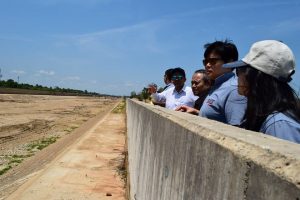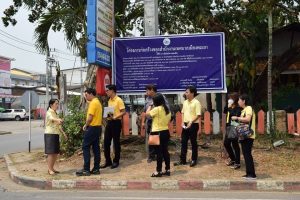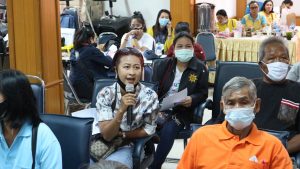Prior to CoST: public infrastructure in context
Thailand is one of the great development success stories. It achieved upper-middle income status in less  than a generation; however, average growth rates have fallen from 7.5% (1986-1996) to 3.5% (2005-2015). Over the past decade, Thailand has gone through a period of political instability which has resulted in a decline in investment from both the public and private sectors. The country is now trapped in the middle-income bracket and has yet to transition to high income country status. In order to achieve this aspiration, the country must maintain an annual growth rate of over 5% for the next 10 years.
than a generation; however, average growth rates have fallen from 7.5% (1986-1996) to 3.5% (2005-2015). Over the past decade, Thailand has gone through a period of political instability which has resulted in a decline in investment from both the public and private sectors. The country is now trapped in the middle-income bracket and has yet to transition to high income country status. In order to achieve this aspiration, the country must maintain an annual growth rate of over 5% for the next 10 years.
In order to help maintain this growth, the government has proposed significant investments in infrastructure, including a number of large mega infrastructure projects, valued at 4.5 trillion THB (US$127.4 billion – 33% of Thailand’s 2015 GDP). These are primarily in the transportation, energy, sanitation, telecommunication and education sectors. However, the bulk of these investments (85%) will be made through State-Owned Enterprises (SOEs) who are widely considered to be inefficient or poorly managed.
CoST Thailand: how it all began
The Anti-Corruption Organisation of Thailand submitted a letter of engagement to the CoST International Secretariat in 2014. CoST Thailand was subsequently established in March 2015 when the Cabinet issued a resolution assigning the State Enterprise Policy Office (SEPO) to pilot the programme. It has since grown from covering just one mega-project under the Airports of Thailand to include projects under the Comptroller General’s Department (CGD) and SEPO. Disclosure has commenced and is ongoing, facilitated by online data platforms.

An existing framework for transparency exists in Thailand: there are at least eight laws focussed on transparency and access to information, which has provided a useful starting point for CoST. Under this framework, 58% of CoST transparency requirements are currently mandated by law, but 56 SOEs are exempt from at least two major transparency laws. This is of significant concern given the crucial role played by SOEs in delivering the government’s ambitious infrastructure investment plans. CoST Thailand therefore has an active role to play; firstly, to expand existing transparency requirements to meet CoST best practice and secondly, to include additional data points pertinent to the local context such as road safety statistics.
The four features of CoST
The CoST approach is focussed on four core features: disclosure, assurance, multi-stakeholder working and social accountability. These features provide a global standard for CoST implementation in enhancing infrastructure transparency and accountability.
Disclosure in Thailand
The disclosure process ensures that information about the purpose, scope, costs and execution of infrastructure projects is open and accessible to the public, and that it is disclosed in a timely manner.
Thailand has advanced information systems; in relation to infrastructure transparency, dedicated CoST disclosure portals have already been created under AOT, SEPO and CGD. Disclosure on a number of projects is already underway and will be scaled up over time. A unifying, single window platform for CoST disclosure is under development to further improve ease of access to information.

These portals are important milestones for CoST as internet penetration in Thailand is high, especially in the context of an upper-middle income country: in 2017, 53 percent of the Thai population were using the internet. In 2023, this figure is projected to grow to 82 percent. This means that CoST disclosure could potentially reach huge swathes of the Thai population. However, targeted efforts should also be made to engage the wider population, including more traditional disclosure channels such as TV, radio or print media.
Since CoST Thailand’s renewed focus on disclosing projects according to the CoST Infrastructure Data Standard in 2018, there has been a rapid growth in disclosure, with 111 projects disclosed in this reporting period. As CoST Thailand has directed its efforts more towards raising awareness of the importance of transparency in public infrastructure delivery, greater public participation and citizen awareness we would expect to see this trend continue.
CoST Thailand is now working to help build capacity to increase compliance, and work with all relevant stakeholders to promote the establishment of new transparency norms.
Online portals
The CoST platform complements the centralised Thai procurement portal “G-procurement”. Citizens can navigate to the CoST platform directly from the government’s landing page.
In June 2021 CoST Thailand launched a new website which allows users to easily access information on infrastructure projects across the country. The platform has data on more than 1,100 current projects – from bidding to completion – and enables citizens to easily provide feedback to the government departments responsible for implementing them.
Assurance in Thailand
We promote accountability through the CoST assurance process – an independent review of the disclosed data by assurance teams appointed by CoST national programmes.
CoST Thailand has published three assurance reports. Its third assurance process in 2019 assessed 10 projects covering sectors such as transport, aviation and flood mitigation, from procuring entities from both local and national government.
The assurance report produced a number of findings relating to each project’s procurement process, contractual management and quality. It also presented conclusions regarding the necessity of each project: an important factor to consider when public money is being used to fund them. In one instance, the report highlighted that using reinforced concrete would be unnecessary on a road where traffic is light. It recommended instead using an alternative, cheaper concrete which would serve the needs of the local community whilst also saving money.
Multi-stakeholder working in Thailand
In 2017, the Cabinet approved a new operational framework for CoST. Under this framework, the CoST Thailand Multi-Stakeholder Group (MSG) is chaired by the Permanent Secretary of the Ministry of Finance. There are two Vice Chairs, the Director General of the CGD and the Chairman of the Anti-Corruption Organisation of Thailand.
Other members include the National Economic and Social Development Board, SEPO, Transparency Thailand, Good Governance for Social Development and the Environment Institute, Engineering Institute of Thailand, Association of Siamese Architects and the Association of Thai ICT Industry.
According to the Cabinet approved framework, CoST Thailand is mandated upon all infrastructure projects valued at over 1 million THB (US$28,000) and will extend to those projects that have a significant impact on the public.
Social Accountability
The social accountability feature of CoST ensures that information on public infrastructure projects are in the public domain. CoST works with stakeholders such as the media and civil society to promote the findings of the assurance process and ensure decision makers are held to account.
CoST Thailand has embarked on a programme of public engagement which brings together local communities with the contractors and procuring entities of projects. Here a safe space has been provided for communities to raise issues on both how the construction process and poor-quality infrastructure affects their everyday lives. This three-way dialogue is an innovative approach in Thailand and one with tangible results. From speeding up project delivery to tackling issues through improved design, it has changed how projects are carried out. Find out more about CoST Thailand’s work fostering dialogue and building trust here.
provided for communities to raise issues on both how the construction process and poor-quality infrastructure affects their everyday lives. This three-way dialogue is an innovative approach in Thailand and one with tangible results. From speeding up project delivery to tackling issues through improved design, it has changed how projects are carried out. Find out more about CoST Thailand’s work fostering dialogue and building trust here.
CoST Thailand Gender Review
In both perception and practice, the infrastructure sector is male dominated. CoST began the process of addressing the issue throughout 2020 by publishing a review into the CoST Thailand programme, Enhancing inclusive infrastructure: A review of gender equality in CoST Thailand. The publication provides a valuable baseline for CoST Thailand to measure progress in gender equality, with lessons for our global members to inform their approach to achieving more gender-inclusive programme delivery.
CoST Thailand Assurance Reports
First Assurance Report
Second Assurance Report
Third Assurance Report
Fourth Assurance Report